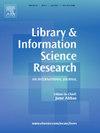How to bridge the gap? Information asymmetry in Tibetan-Chinese bilingual search behavior
IF 2.3
3区 管理学
Q2 INFORMATION SCIENCE & LIBRARY SCIENCE
引用次数: 0
Abstract
Significant information asymmetries exist between majority and minority languages on the web. The information asymmetry makes it difficult for ethnic minorities to access online information in their native languages, exacerbating their information vulnerability. It is necessary to investigate whether the information asymmetry between these two languages affects the language selection and interaction behavior of bilinguals in online searches. A user search experiment (N = 30) was conducted in Tibetan-Chinese bilinguals, combined with retrospective think-aloud interviews. Tibetan-Chinese bilinguals showed a preference for Chinese search, seen as a native language (L1) loss tendency in search. The bilinguals present an information asymmetry stereotype, which influenced their search language selection and negatively affected their search behavior. Four search phases for Tibetan-Chinese bilinguals were identified: direct search, vigilant avoidance, blind attempts, and serendipitous search.
如何弥合差距?藏汉双语搜索行为中的信息不对称
在网络上,多数语言和少数语言之间存在着显著的信息不对称。信息不对称使得少数民族难以获取母语网络信息,加剧了他们的信息脆弱性。两种语言之间的信息不对称是否会影响双语者在网络搜索中的语言选择和互动行为,这是有必要研究的。在藏汉双语者中进行用户搜索实验(N = 30),并结合回顾性的有声思考访谈。藏汉双语者对汉语搜索的偏好表现为母语搜索的丢失倾向。双语者存在信息不对称刻板印象,这种刻板印象影响了他们的搜索语言选择,并对他们的搜索行为产生负面影响。藏汉双语者的搜索阶段分为直接搜索阶段、警惕回避阶段、盲目尝试阶段和偶然搜索阶段。
本文章由计算机程序翻译,如有差异,请以英文原文为准。
求助全文
约1分钟内获得全文
求助全文
来源期刊

Library & Information Science Research
INFORMATION SCIENCE & LIBRARY SCIENCE-
CiteScore
4.60
自引率
6.90%
发文量
51
期刊介绍:
Library & Information Science Research, a cross-disciplinary and refereed journal, focuses on the research process in library and information science as well as research findings and, where applicable, their practical applications and significance. All papers are subject to a double-blind reviewing process.
 求助内容:
求助内容: 应助结果提醒方式:
应助结果提醒方式:


